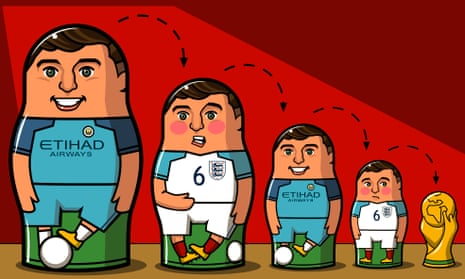This time. More than any other time. We’re going to find a way. Find a way to express key drivers of our unique but non‑prescriptive footballing DNA under a holistic development pathway. Getting it all together. We’re on our way!
Well, that’s all done now. England will be present at Russia 2018 after a room temperature qualifying campaign reached a grippingly dull resolution against Slovenia at Wembley. And really, it is worth remembering that for those who follow England these are the good times. With a place in the velvet ball bag assured we have a small interlude to purr at the prospect of wandering around the vast city-scapes of Europe’s great alien superpower worrying about Gary Cahill’s minor calf strain; to argue with doltish enthusiasm about tactics and selection; and above all to dream a little. Although if you believe the publicity it seems likely Gareth Southgate and his team of FA wonks, hangers-on and brochure‑wanglers are just as likely to spend the next few months worrying about the wider existential questions that have preoccupied the current FA.
This is where we are in the many ages of England football, a journey from post-imperial delusion, to bruised hope, to a regime wreathed in sombre, damp‑eyed, cod-intellectual introspection, the endless blather about identity and DNA, the ludicrous idea of implanting a mannered, off-the-peg possession football at every level.
In the shadow of which it is easy to forget that success or failure at football isn’t a register of “who you are”, a matter of tapping into some deeper well of a more righteous strain of Englishness. Football is still also a sport of fine details and pragmatism; just as England do have genuine talent that needs to be nurtured and presented in the right way.
Most would accept the obvious hope is to pin the entire tactical jig on finding the right chemistry for the attacking talents of Harry Kane, Dele Alli and Marcus Rashford. I would add something more to this. Behind that attack, but also linked to how England hope to play, Southgate could do a lot worse than take a tip from Pep Guardiola and put as much energy as possible into wringing the most out of John Stones.
Yes, that John Stones. The same Stones who was, it must be said, terrible on Thursday night, who gave the ball away and might have been sent off. The same Stones who remains England’s most talented player outside the front three. And the same Stones who embodies better than anyone else right now the phenomenon of good club players completely unable to transfer their talents to England even in a more insulating tactical system.
For much of the game against Slovenia he resembled the Stones of last season, a player so often dismissed with a genuine anger as effete and uppity, a ball-playing English defender with the nerve – the stones on this guy – to make the odd mistake.
The images are still vivid, Stones looking pale, frazzled and ill, constantly in the process of playing some doomed square pass towards a cartwheeling Claudio Bravo while the TV commentator says things like “Stones, again” and the camera cuts to Guardiola looking pensive in a pair of patent leather Converse and a goose-down existentialist’s turtle neck, scratching his chin and muttering things like “lateral transition failure” before suddenly dropping to one knee and performing a wildly energetic mime of a man trapped inside a small glass tube.
As recently as March, a horribly damning stat was doing the rounds stating that Stones had made more errors leading directly to a goal than any other outfield player in Europe’s top five leagues that season. And yet, Stones’s improvement with Manchester City this season has been pronounced and predictable. Maybe what he needed was simply a decent goalkeeper behind him, a season to bed in and a little confidence. He still glides out and tries to pass to a team-mate. But he’s also done less of the tricky stuff, playing instead right up close to the back of his midfield in a system that challenges him to focus at all times and to be constantly involved.
He has racked up some wonderful stats in the process. In the Premier League, Stones has completed 431 of 466 passes this season, committed three fouls and been dispossessed once. City have conceded one goal with Stones on the pitch. Get this, too: England have yet to concede a goal in any competitive game in which Stones has played. His record: played eight, won seven, no goals conceded. He may be error-prone, a little cocky and playing in a team that attacks rather than defends (although he sees a lot of the ball), but Stones is clearly doing something right here.
There are one or two points worth noting about this. First, Southgate might prefer Gary Cahill and Phil Jones. But Stones has skills that speak to the obvious weakness in this England team, that stodginess right in the centre, with a pair of hustling midfielders clogging the space in front of a defender who carries the ball better than both. At times on Thursday night Stones simply stood waiting, looking a little bored while Eric Dier and Jordan Henderson clomped about in their snow shoes setting the lukewarm midfield rhythms.
Guardiola has shown that fluidity starts from the back, even for a notably attack-minded coach. But then he always, always does make his defenders push themselves, getting the best out of Gerard Piqué and Jérôme Boateng at Barcelona and Bayern Munich, and now setting his sights on Stones. Southgate might want to try thinning the base of midfield, letting his centre-back carry the ball out, deploying his resources a little further up. Trust in Stones. What’s the worst that can happen? Actually, no. Don’t answer that.
Beyond this, if we really must dwell on identities and DNA, then the ball-playing defender has long been a part of the secret history of English football. Never mind the direct football fallacy. All the best England teams have had this quality, from the obvious example of Bobby Moore, to Mark Wright and Terry Butcher stepping out from the back in 1990 – Butcher’s centre-circle back-heel in a World Cup semi-final is a thing of legend – to Southgate, Tony Adams and Stuart Pearce at Euro 96 gamely plodding out into the wide green spaces.
Nobody seriously expects this rather apologetic England to shake the world in Russia next year. But playing to their brittle but tangible strengths and trusting in the talent they have is surely the way to re-engage a rather weary public. The Premier League style is usually taken to mean speed and aggression, but Guardiola’s perky looking City team show it can also mean craft and bravery on the ball. It is still better to show some ambition and fall short, than simply fall short.

